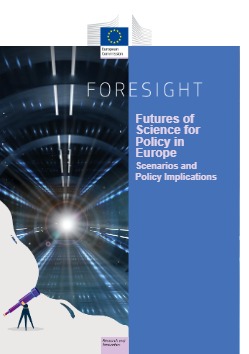Last Edited: 5 months ago
Futures of Science for Policy in EuropeAugust 2023
Scenarios and Policy Implications
In this brief, we explore practices and processes by which information should be exchanged between knowledge actors and policy-makers with the intention to produce scientifically informed policies in Europe. We can see an increasing prominence of science in many public debates and the increasing willingness of governments to mobilize scientific and other advice mechanisms in the context of public debate.
The aim of science for policy is to produce actionable science, however, the level of control over those producing the knowledge and their responsibility for the consequences of the action is a matter of important societal dispute. Debates and interactions in the political and public space encompass interest-driven channels of communication, including scientific advice but also lay knowledge.
Therefore, science for policy needs to integrate knowledge from different sources and this requires building connections and relationships between actors from different scientific disciplines and across public administrations, affecting both the nature of science and the nature of policy-making. Science for policy may face adjustments in its modes of operation and its formats of interaction, which – at times – may well be at odds with the dominant empirical-analytical perception of science.
We make a deep dive into developments which are currently underway in the realm of research and innovation policy, and which can take us to different futures, including events largely unpredictable and decisions bound by constraints of diverse nature. We identify possible policy implications based on five scenarios of the future (in 2030), which highlight different types of science for policy ecosystems:
- Scenario A on societal-challenge-driven and mission-oriented research and policy provides the context for advice mechanisms to policy. Such a context can be amenable for scientific advice but it also entails risks for science.
- Scenario B on participatory science and policy support ‘under construction’ opens up the discussion on broadening the sources of evidence; why and how to include new types of actors beyond the ‘usual suspects’ (well-connected experts). This has implications for how to promote science and develop the policy support system.
- Scenario C on data enthusiasm and AI overtaking scientific policy advice illustrates the role of data, AI and international governance challenges and it alarms about over-reliance on multinational data providers, which may lead to a loss of transparency, autonomy and (normative) reflection in scientific advice. We should ask whether technology can be neutral, and whether scientific advice can be normative.
- Scenario D on open science and policy support points out that open science is not the same as open scientific advice whereby experts can speak frankly. Useful scientific advice has characteristics of a protected space where also unpopular (but well-founded) opinions can be voiced.
- Scenario E on policy-based evidence-making in incumbent-driven industrial policy increases weight on advice mechanisms and embedding data, evidence, and experimentation within government agencies, and government research and regulatory organisations.
Posted on: 18/11/2024
